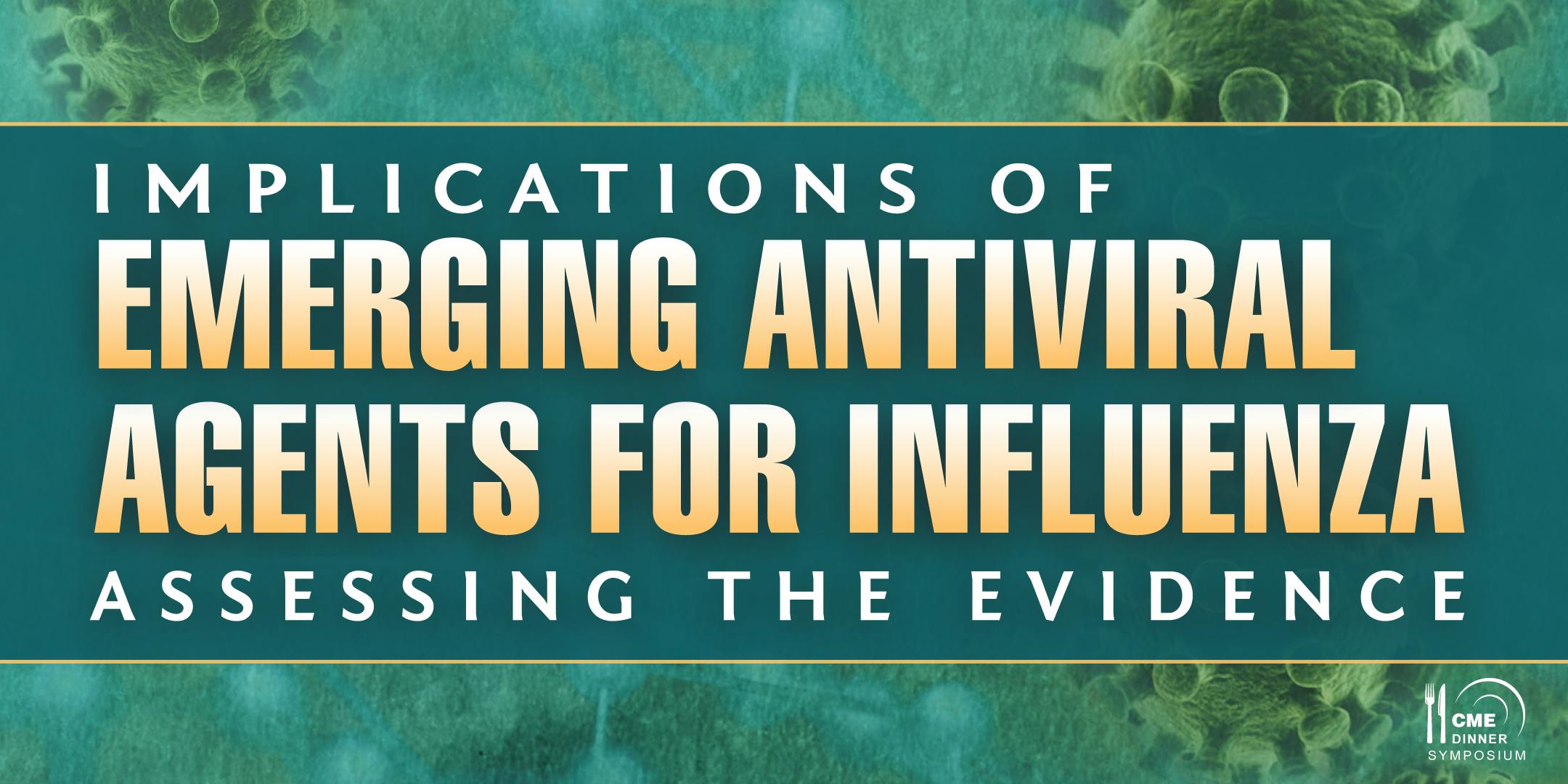Fri October 5, 2018
Implications of Emerging Antiviral Agents for Influenza: Assessing the Evidence
SEE EVENT DETAILSThis program is intended for IDWeek 2018™ attendees, only.
Activity Chair
Frederick G. Hayden, MD, FACP, FIDSA Professor Emeritus of Medicine Stuart S. Richardson Professor Emeritus of Clinical Virology University of Virginia School of Medicine Charlottesville, VA
Faculty
Aeron C. Hurt, PhD Associate Professor Senior Research Scientist, Head of Antiviral Susceptibility WHO Collaborating Centre for Reference and Research on Influenza Melbourne, Victoria, Australia
Michael G. Ison, MD, MS, Professor, Divisions of Infectious Diseases and Organ TransplantationNorthwestern University Feinberg School of MedicineChicago, IL
Nelson Lee, MD, FRCP(Lond), FIDSAProfessor, Division of Infectious DiseasesDepartment of MedicineUniversity of Alberta Edmonton, Canada
Overview
The administration of influenza vaccines has remained the most effective way to prevent seasonal influenza. However, vaccines have been known to provide suboptimal protection in high-risk groups. Moreover, they may be ineffective when there is an antigenic mismatch among viruses in the seasonal vaccine and those circulating in the community. Comparatively, antiviral drugs for influenza typically remain effective against antigenic drift variants or newly emerged pandemic viruses because they target highly stable or conserved components of the virus. Clinical trials and observational data show that early antiviral treatment can shorten the duration of fever and illness symptoms and may reduce the risk of complications from influenza. The Centers for Disease Control and Prevention issued a Health Advisory in which they recommended the use of antiviral medications for the treatment of influenza as an important adjunct to annual influenza vaccination. Two classes of antiviral drugs are currently available for the prevention and treatment of influenza: neuraminidase inhibitors and adamantanes. Many antivirals now under investigation in late-stage clinical trials differ in their mechanisms of action compared with drugs currently licensed for the treatment of influenza. This CME activity will evaluate emerging antiviral agents with respect to their novel mechanisms of action, ability to prevent resistance, and efficacy of treatment.
Agenda
5:30 PMRegistration and Dinner
6:00 PM Introduction and PretestFrederick G. Hayden, MD, FACP, FIDSA
6:10 PM The Influenza Epidemic – How Did We Do in Terms of Prevention and Treatment?Michael G. Ison, MD, MS, FIDSA
6:25 PM New Players in Influenza – New Mechanisms of ActionAeron C. Hurt, PhD
6:40 PM Efficacy of Late-Stage Investigational Polymerase Inhibitors for InfluenzaNelson Lee, MD, FRCP(Lond), FIDSA
6:55 PM Panel Discussion: New Players in Influenza – How They CompareFrederick G. Hayden, MD, FACP, FIDSA
7:10 PMPosttest
7:15 PMQuestion and Answer
7:30 PMConclusion
Learning Objectives
Upon successful completion of this activity, participants should be better able to:
Compare the efficacy and mechanisms of action of therapeutic agents in late-stage clinical trials to those currently available to prevent and treat influenza.
Evaluate the latest clinical trial data regarding the therapeutic efficacy of agents in late stage development for the treatment of influenza.
Assess the effects of emerging influenza treatments for their ability to reduce clinical illness, the duration of illness, viral shedding, and complications.
Target Audience
The intended audience for this activity is infectious disease specialists and other health care professionals involved in the treatment of patients with influenza.
This continuing medical education activity is provided by Vindico Medical Education.
This activity is supported by an educational grant from Genentech, Inc.
This activity is not affiliated with the official program of IDWeek 2018™.
Vindico Medical Education is accredited by the Accreditation Council for Continuing Medical Education to provide continuing medical education for physicians.
Vindico Medical Education designates this live activity for a maximum of 1.50 AMA PRA Category 1 Credit(s)™. Physicians should claim only the credit commensurate with the extent of their participation in the activity.
In accordance with the Accreditation Council for Continuing Medical Education’s Standards for Commercial Support, all planners, teachers, and authors involved in the development of CME content are required to disclose to the accredited provider their relevant financial relationships. Relevant financial relationships will be disclosed to the activity audience.
Faculty, topics, program schedule, and credit hours are subject to change. Audiotaping or videotaping is prohibited without written permission from the program committee.
This program is intended for IDWeek 2018™ attendees, only.
Activity Chair
Frederick G. Hayden, MD, FACP, FIDSA Professor Emeritus of Medicine Stuart S. Richardson Professor Emeritus of Clinical Virology University of Virginia School of Medicine Charlottesville, VA
Faculty
Aeron C. Hurt, PhD Associate Professor Senior Research Scientist, Head of Antiviral Susceptibility WHO Collaborating Centre for Reference and Research on Influenza Melbourne, Victoria, Australia
Michael G. Ison, MD, MS, Professor, Divisions of Infectious Diseases and Organ TransplantationNorthwestern University Feinberg School of MedicineChicago, IL
Nelson Lee, MD, FRCP(Lond), FIDSAProfessor, Division of Infectious DiseasesDepartment of MedicineUniversity of Alberta Edmonton, Canada
Overview
The administration of influenza vaccines has remained the most effective way to prevent seasonal influenza. However, vaccines have been known to provide suboptimal protection in high-risk groups. Moreover, they may be ineffective when there is an antigenic mismatch among viruses in the seasonal vaccine and those circulating in the community. Comparatively, antiviral drugs for influenza typically remain effective against antigenic drift variants or newly emerged pandemic viruses because they target highly stable or conserved components of the virus. Clinical trials and observational data show that early antiviral treatment can shorten the duration of fever and illness symptoms and may reduce the risk of complications from influenza. The Centers for Disease Control and Prevention issued a Health Advisory in which they recommended the use of antiviral medications for the treatment of influenza as an important adjunct to annual influenza vaccination. Two classes of antiviral drugs are currently available for the prevention and treatment of influenza: neuraminidase inhibitors and adamantanes. Many antivirals now under investigation in late-stage clinical trials differ in their mechanisms of action compared with drugs currently licensed for the treatment of influenza. This CME activity will evaluate emerging antiviral agents with respect to their novel mechanisms of action, ability to prevent resistance, and efficacy of treatment.
Agenda
5:30 PMRegistration and Dinner
6:00 PM Introduction and PretestFrederick G. Hayden, MD, FACP, FIDSA
6:10 PM The Influenza Epidemic – How Did We Do in Terms of Prevention and Treatment?Michael G. Ison, MD, MS, FIDSA
6:25 PM New Players in Influenza – New Mechanisms of ActionAeron C. Hurt, PhD
6:40 PM Efficacy of Late-Stage Investigational Polymerase Inhibitors for InfluenzaNelson Lee, MD, FRCP(Lond), FIDSA
6:55 PM Panel Discussion: New Players in Influenza – How They CompareFrederick G. Hayden, MD, FACP, FIDSA
7:10 PMPosttest
7:15 PMQuestion and Answer
7:30 PMConclusion
Learning Objectives
Upon successful completion of this activity, participants should be better able to:
Compare the efficacy and mechanisms of action of therapeutic agents in late-stage clinical trials to those currently available to prevent and treat influenza.
Evaluate the latest clinical trial data regarding the therapeutic efficacy of agents in late stage development for the treatment of influenza.
Assess the effects of emerging influenza treatments for their ability to reduce clinical illness, the duration of illness, viral shedding, and complications.
Target Audience
The intended audience for this activity is infectious disease specialists and other health care professionals involved in the treatment of patients with influenza.
This continuing medical education activity is provided by Vindico Medical Education.
This activity is supported by an educational grant from Genentech, Inc.
This activity is not affiliated with the official program of IDWeek 2018™.
Vindico Medical Education is accredited by the Accreditation Council for Continuing Medical Education to provide continuing medical education for physicians.
Vindico Medical Education designates this live activity for a maximum of 1.50 AMA PRA Category 1 Credit(s)™. Physicians should claim only the credit commensurate with the extent of their participation in the activity.
In accordance with the Accreditation Council for Continuing Medical Education’s Standards for Commercial Support, all planners, teachers, and authors involved in the development of CME content are required to disclose to the accredited provider their relevant financial relationships. Relevant financial relationships will be disclosed to the activity audience.
Faculty, topics, program schedule, and credit hours are subject to change. Audiotaping or videotaping is prohibited without written permission from the program committee.
show less
Date/Times:
747 Howard Street, San Francisco, CA 94103
The Best Events
Every Week in Your Inbox
From Our Sponsors
UPCOMING EVENTS
Great suggestion! We'll be in touch.
Event reviewed successfully.









